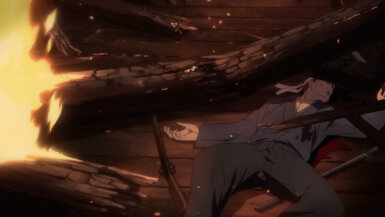 |
 |
 |
 |
 |
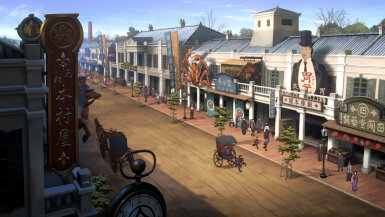 |
 |
 |
 |
 |
 |
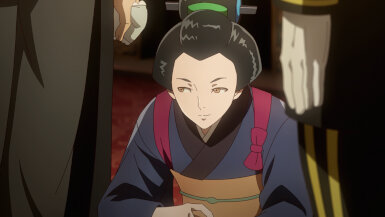 |
 |
 |
 |
 |
 |
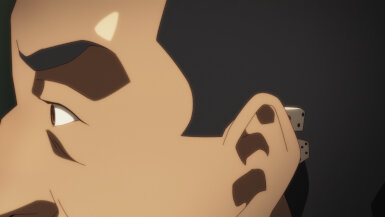 |
 |
 |
 |
 |
 |
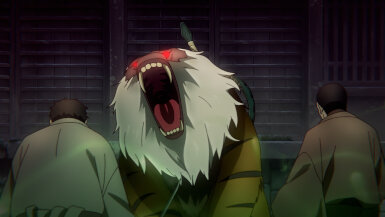 |
 |
 |
 |
 |
 |
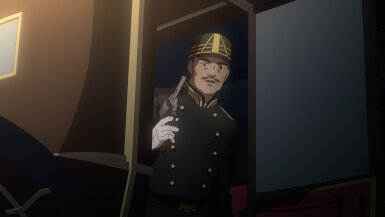 |
 |
 |
 |
 |
 |
 |
“Episode 1”
To tickle the historical fancy this season, we have Meiji Gekken. Set in the upheaveal of the Meiji Revolution and subsequent unrest following the change in government, we have former samurai Shizuma Origasa (Nakamura Yuuichi) who give up the sword and takes up the rickshaw in an effort to find his fiancée Sumire.
Not all former samurai are content to lay low, like ones such as Torikichi. Torkichi is a one-time customer of Origasa’s who partakes in an assassination attempt on one of the new government leaders, Tomomi Iwakura. Unfortunately, Origasa gets blamed for it because Torikichi leave his geta on the scene, a geta which he sent Origasa to buy after his broke upon alighting from the rickshaw.
What rotten luck for Origasa, but he’s more than able to take care of himself with the unbeatable combination of strength, sword skills, and more than a little luck. He certainly has guts in spades, confidently taking on a whole crew of armed samurai lying in wait for what they think is Minister Ohkubo’s carriage on his ownsome. Origasa proves he can hold his own with some quick foot/handwork leading to a standoff with the leader and a close brush with death, saved by his headplate.
I like Origasa, he’s got lots of pluck- “The rabbit’s my symbol, I’ll even take you to the moon!”. In spite of the hand he’s been dealt, going from being a samurai to rickshaw driver just to make ends meet, he holds no grudges. Heck, he goes so far as to help the police even though falsely accused (and to clear his name, of course). In the end, he gets offered a position in the police forces. Whether he takes it or not is left for next week, but I’m half wondering if he will take it. On the one hand, he seems content to live and let live, taking no sides. Perhaps in part because he has to in order to avoid attention, coming from the Aizu domain which is already in the government’s bad books because of the rebellion they recently put down there. On the other hand, taking it would be convenient plot-wise, bringing him one step closer to Sumire (not that he knows that).
Sumire (I’m just assuming that’s who she is) is an intriguing character. She’s certainly not sitting quietly waiting for Origasa to come for her. By day she poses as a maid in the Meiji government office, collecting intel for the British. By night, she entertains customers to bring in recruits for the anti-Meiji government forces and even passes along weapons secured from her spy side job. I’m curious if she’s doing this out of revenge for her brother’s death in the rebellion or out of her own principles, separate from her brother. Her work will also put her at odds with Origasa should he take the police post- probably not what he envisioned finding when Origasa started his search for Sumire.
The Sumire-Origasa-Meiji government is only just one part of the story. We also have Kyoushirou Shuragami (Mikami Satoshi)who shows up at the gambling den. Not sure what his deal is, but he has a sharp eye, catching the dishonest game-master red-handed. It doesn’t seem like he came for money, turning down the hush bribe offered, then leaves shrouded in mystery. He’s got some pretty bizarre friends there- the Buddhist monk with the hallucinogenic incense, the Catholic archer girl, and the guy with the knock-out punch. Again, we don’t know what their angle is, whether they’re acting on their own self-interests or part of some underground force, but they add extra color to the cast of characters.
While set in a different era, Meiji reminds me of Revenger in some ways- something I’ll always welcome as I quite enjoyed that series. And of course, let’s not forget the overlaps this has with Ruroni Kenshin in both timeline and the spirit of lost samurai trying to find their way in a new world that no longer needs them. I am curious where Origasa falls in all of this- as I mentioned earlier, he doesn’t seem to lean strongly one way or the other in terms of politics or morals, he’s just a good guy trying to get by. I don’t that he’s going to be able to stay that way, he’s going to have to pick a side the way things seem to be heading…

I am not a history buff, but this is such a thrilling Anime about the Meiji era. My only complaint is that Demon Slayer spoiled this era for me. Every action scene in Meiji Gekken 1874, I keep thinking, ‘Tanjiro!!! We need your help!!!’
Off by one. Demon Slayer is set in the Taisho era.
I get these two eras mixed up all the time. However, I have to say the art style is very similar to Demon Slayer.
However, I can’t tell if my perspective is skewed because both the Meiji and Taisho period ended during the same year.
Meiji ended 1912, Taisho was 1912-1926.
I guess I googled the eras wrong…(∏.∏)